- Home
- James Carol
The Quiet Man Page 17
The Quiet Man Read online
Page 17
The third movement came to a satisfying close and for a while Winter sat there in silence. It was an hour until sunset and the suite was slowly getting darker. The light from the TV flickered faintly around the room and painted ghostly abstract images on the wall. He took another sip of whisky and put the tumbler down. Was Sobek still at the cemetery or had he gone home? Winter decided that he’d still be there. He’d hang on in there until the bitter end, until the last trace of light had drained from the day.
An idea suddenly occurred to him and he chased it around for a while. The more he chased, the more he thought that he might be on to something. One of the big problems with this case was the lack of escalation. Serial killers were like drug addicts in that they were always chasing the perfect high. As the series progressed they took more and more risks in a futile attempt to attain that. The fact that the reality always fell short of the fantasy didn’t put them off. If anything, it spurred them on.
When you looked at these murders, though, there was no escalation. The way Isabella Sobek was killed was the same as Alicia Kirchner, and her murder was the same as Lian Hammond’s. There were differences with Myra Hooper’s murder, but no real escalation. The way that all four women had been murdered was efficient and businesslike. There was no emotion. It was as though the killer was following a script. The impression being given here was that the murders were a means to an end. Which now made sense, because that’s exactly what they were. A means to an end. The killer’s real targets were the husbands.
And Cody.
The fact that the killer had talked to him marked a definite escalation. But there had to be some sort of payoff, otherwise what was the point? Serial killers had been known to join the crowds at crime scenes. Standing there knowing that they were responsible for all the chaos gave them a thrill. The fact that nobody knew who they were just made it more intense. Anderton had checked the crowds gathered at the earlier murder scenes to see if anyone stood out. No one had. Freeman would no doubt be doing the same thing with the latest scene, but Winter wasn’t holding his breath.
Funerals sometimes drew killers out, and for the same reasons. It helped to intensify the memories. Anderton had been on the ball there, too. She’d filmed the mourners at the funerals, but nobody had stood out. Freeman would record those at Myra Hooper’s funeral. Again, Winter had no great expectations.
At the moment it was as though the killer had set up the murders and that’s where his involvement ended. This seemed like a lot of hassle for very little return. He’d be following the news. That much went without saying. But would that be enough to justify the time, effort and risk?
There was something missing from the picture. But what? What was actually going on here? Winter picked up his tumbler and sank back into the sofa. The glass was cold against his lips and the whisky burned his throat. He thought about Nicholas Sobek imprisoned in the basement of his luxury house. Then he thought about Eric Kirchner, broken and alone in his cheap landlord-decorated apartment. Then he thought about David Hammond three thousand miles away on the other side of the country. And Cody, nestled into his beanbag, lost and guilt-ridden and missing his mom.
With any murder the spotlight always fell on the victim. That’s where the real action was. But what about the secondary victims? The ones who fell between the cracks? The Nicholas Sobeks and Eric Kirchners and David Hammonds and Cody Hoopers? Usually they were forgotten about, but not this time. This killer didn’t care about the dead women, but he did care about their husbands. And Cody. They were the ones who resonated with him. Those were the ones who made his heart sing.
The killer had chosen his targets carefully, and he’d arranged it so they had killed someone they loved. And then he’d just walked away and hadn’t looked back? That wasn’t going to happen. Newton’s Third Law came into play again. This guy had caused something to happen, and now that it had happened he would be curious to see what the reaction was. Winter was curious too, and he was nowhere near as invested.
So what had the killer seen when he glanced back over his shoulder?
It was a good question. This time Winter knew where to start looking for the answer. He called down to the front desk and asked the receptionist to call a cab. Then he drained his tumbler, grabbed his leather jacket and headed for the door.
34
A cab was waiting at the kerb when Winter got outside. He climbed into the back and gave the driver Eric Kirchner’s address on East Seventh Avenue. Traffic was light and it only took ten minutes to get there. The driver pulled over to the sidewalk opposite the apartment and Winter got out. He watched the cab pull away before walking over to the entranceway of a nearby building and merging with the shadows gathering there. Then he lit a cigarette.
The sky was turning to orange and getting darker, the temperature dropping as night closed in. Eric Kirchner’s apartment was on the third floor of the building directly opposite. The second window on the right was his living room. The drapes were drawn, the lights on, and the thin material was glowing like a Chinese lantern. Kirchner had probably closed them after they’d left earlier. Drapes didn’t just keep the dark at bay, they also created a barrier that separated you from the rest of the world. It defined your safe place. Today was the anniversary of Alicia’s murder. If there was ever a day when Kirchner wanted to keep the world at arm’s length, this was it.
Winter took a long drag on his cigarette, the tip glowing hot and orange. Maybe the killer had walked along this street. Maybe he’d stood in this doorway and watched for a while. He could have done that easily enough without raising much suspicion. In the time Winter had been here ten cars had passed by and a couple of pedestrians, and no one had given him a second glance. And why should they? He was just a guy smoking a cigarette. Probably just waiting for someone. Nothing suspicious here, move on. And he wasn’t even trying to be inconspicuous. If he had been, he would have had his cell out. Cell phones were perfect urban camouflage. Winter looked over at the apartment building and half expected Kirchner’s face to appear at one of the windows. Had the killer harboured those same expectations? If so, had he been disappointed when it hadn’t come to pass? And what had he done to curb that disappointment?
At some point watching wouldn’t have been enough. He’d want to get closer. Like he’d done with Cody. Winter finished his cigarette and crossed the street. There was no lock on the apartment building door so he was able to walk straight in. He passed the line of mailboxes and headed for the stairs. So far he’d seen a total of zero security cameras. He climbed the stairs to the third floor and walked along the corridor to Kirchner’s apartment. Still no cameras.
He knocked on the door. No answer, so he knocked again, harder this time. Still no answer. He tried a third time, really putting his weight into it. This was a full-on cop knock. Kirchner should be rushing to answer. Winter reckoned that he should be hearing hurried footsteps in the hall, and the rattle and thump as the lock was hastily undone. The door should be opening about now, and Kirchner should be standing there dazed and confused and looking like he was wondering who’d died.
But that wasn’t happening, which was a concern. The fact that the lights were on indicated that he was home. The fact that his beat-up heap of a car was parked outside reinforced this. Winter went through possible scenarios in his head. Worst case: Kirchner was in there with a belt wrapped around his neck, one end attached to a door handle. Or lying in a warm bath with his veins sliced open from elbow to wrist, the water turning pink. Or staring at the revolver on his lap, psyching himself up.
Because August 5 wasn’t just a special date in the killer’s calendar, it was special to Kirchner as well. Trigger points didn’t just precede murders, they preceded all sorts of crazy irrational behaviour. It was a statistical truth that there were more suicides at Christmas than at any other time of the year. Why? Because Christmas was all about family and memories and having a good time. And if those memories were bad ones, and if the relationships had broken down,
then things were going to get emotionally charged, and that’s when suicide might start to seem like a good idea. The anniversary of a loved one’s death would be high on that list too, particularly if the loved one had died violently and unexpectedly.
Winter knocked one last time, loud and insistent. Nobody came running to answer. His lock picks were wound up in a leather wrap in the inside pocket of his jacket. They were made from tungsten carbide and, in most instances, as good as a key. The lock was a standard Yale. No big deal. He might have come last in the self-defence classes at Quantico, but he’d aced lock-picking.
The tension wrench went in first. Winter laid it against the pins, moved it slightly to the left, then bounced it a couple of times to get a feel for how much pressure was required. Then he inserted the pick all the way to the back of the lock and slowly pulled it forward, disengaging the pins one by one. The last one released and he removed the pick. A quick twist of the tension wrench and the door was open. By his reckoning, he’d broken the ten-second barrier. He took one last look along the corridor then slipped quietly into the apartment.
35
The bathroom door was open but the bathtub was empty. No sign of steam rising from it. No water turning pink. Kirchner wasn’t in the bedroom either. There was no belt attached to the handle. No body straining against the leather. Winter found him lying on the living-room sofa, eyes shut, not moving. His first thought was pills. Sleeping tablets or painkillers, or maybe antidepressants. But there were no empty pill bottles or bubble packs lying around. The only items on the table were a laptop, a large bottle of cheap vodka and a tall highball glass. Depending on your perspective, the glass was either half full or half empty.
Winter walked over to the sofa to check for a pulse. Before he got there Kirchner let out a loud snore and shifted to get comfortable. Winter froze. Any moment now Kirchner’s eyes were going to spring open and the shouting would start. This was the sort of apartment block where people kept to themselves, the sort of place where shouted arguments were no doubt a common occurrence. It was unlikely that anyone would call the cops, but they might. Spending the night in a cell was not his idea of a good time.
Kirchner let out another snore and shuffled around on the sofa again. Winter stood very still and tried not to breathe. Kirchner moved one last time before settling down. His chest rose and fell, rose and fell. Winter counted six more breaths before deciding it was safe to move.
He walked over to the table and picked up the vodka bottle. If this had been opened today then Kirchner had drunk almost a pint and a half. If that turned out to be the case then he’d be out cold until morning. Winter put the bottle back down and tapped the laptop’s trackpad. The screen flared to life and Alicia Kirchner’s Facebook page appeared. There had been a flurry of new remembrance posts over the last couple of days. Not so many as last year and nowhere near the number there had been on the year of the murder. That was how it worked. With each passing year fewer and fewer people would remember, until no one did.
Winter clicked through the tabs. Kirchner had been surfing suicide websites. Sites that outlined the dos and don’ts, chat forums where depressed people could go to talk each other into killing themselves. When you got down to it the same questions were being asked over and over again. How did you make it quick and painless? How did you make sure you got it right? Most people didn’t want to suffer. Nor did they want to wake up the next day and find that they’d screwed up. Judging by some of the material that Kirchner had been looking at it was probably just as well that he had passed out.
An old armchair was positioned next to the sofa. The chair was a faded blue, the sofa a dull red. Winter sat down in the armchair and thought about where he might hide a camera. The living room was an obvious first choice, since this was where Kirchner would spend most of his waking hours when he was at home. The TV tucked away in the corner was the room’s focal point. It was a standalone unit rather than wall-mounted. The screen was maybe twenty inches, small by modern standards. Both the sofa and the armchair were angled toward it. The sofa had prime position, which indicated that this was where Kirchner preferred to sit. The fact that he was currently crashed out on it backed up this theory.
Winter walked over to the TV and hunkered down in front of it. From here he could see everything that was happening in the room. If you were looking to hide a camera this would be your start point. He checked the TV first, then the cabinet, then the walls and the ceiling surrounding it. Nothing. Next he moved clockwise around the room, checking everywhere he could think of. When he reached the door he walked back to the TV and went counterclockwise. Still nothing.
The bedroom was next. Assuming that passing out on the sofa wasn’t a regular occurrence, this was where Kirchner would spend most of his time when he was at home. Eight hours a night. Maybe more, maybe less. It depended on his sleep pattern. The room smelled stale and the laundry basket was overflowing. The quilt was wrapped into a ball that had been discarded in the middle of the bed. The bed linen was crumpled and hadn’t been washed in a while.
Winter perched on the edge of the bed and took a look around, wondering where he’d put a camera. Then he went searching. Five minutes later he admitted defeat. He tried the bathroom next, then the kitchen. Nothing and nothing. The kitchen was a health inspector’s worst nightmare. It was a miracle that Kirchner hadn’t poisoned himself. Winter felt sorry for him. He hadn’t asked for any of this. He’d clearly given up on life. In that respect, Kirchner reminded Winter of his mom. She’d given up, too.
Kirchner was still alive when Winter got back to the living room. World War Three could have kicked off and he wouldn’t have woken up. He moved Kirchner’s feet to clear a space, then sat down. This didn’t make sense. What was the killer hoping to gain by targeting Kirchner? As far as Winter could see he was getting nothing out of the deal. Zip, nada, zilch. But he had to be getting something. You didn’t go to this amount of trouble without there being some sort of reward.
Winter tapped the trackpad and Alicia’s Facebook page appeared on the screen. Another message of condolence had come in while he’d been going through the apartment, this one from one of Alicia’s girlfriends. Remembering the fun times. Miss you babes xxx. The laptop was in easy reach of the sofa, a lifeline to the world that Kirchner was in danger of leaving behind for good.
It suddenly occurred to Winter that the TV wasn’t the only focal point in the room. What about the laptop? He looked at the TV, then looked back at the laptop. It was a definite possibility. He checked Kirchner one last time to make sure that he was still breathing. He was lying on his side. If he threw up then at least he wouldn’t choke to death.
Winter closed the laptop, then tucked it under his arm and headed for the door.
36
The sun was all the way down by the time Winter got outside, streetlamps burning the length of East Seventh Avenue. He dug Jefferies’s business card from his back pocket and made the call. The detective answered on the fifth ring with a ‘Yeah, who is it?’ He sounded bright and alert, like he was cruising on adrenaline. Winter could relate.
‘And you said I wouldn’t call.’
‘Winter?’
‘You were expecting someone else? I’ve got to tell you, Jefferies, I’m hurting here. I thought I was the only one.’
‘Whatever this is about, make it quick. I’m up to my eyes here.’
‘Just wondering if there were any developments.’
‘Nope. What about you? Got anything to share?’
‘Not right now.’
‘And how did I know you were going to say that.’ Jefferies paused a second. ‘Okay, now we’ve taken care of the preliminaries, how about you tell me why you’re really calling?’
‘I’m at Eric Kirchner’s apartment. His lights are on, but he’s not answering the door.’
‘And why, pray tell, are you at Kirchner’s apartment?’
‘You’re kind of missing the point here, Jefferies. Today is the anniversary o
f his wife’s murder. When we saw him this afternoon he seemed depressed.’
‘Yeah, I get all that. My question still stands, though. What are you doing at his apartment in the middle of the night?’
‘It’s not the middle of the night.’
Jefferies said nothing.
‘I had a couple of follow-up questions,’ Winter went on. ‘He wasn’t answering his phone, so I made a house call. His apartment’s not far from my hotel. It’s no big deal.’
Jefferies was still saying nothing.
‘You have a duty to serve and protect. Right now, I’m just a concerned citizen who’s worried about one of his fellow men. So are you going to send someone around to check on him or not?’
‘Yeah, I’ll send someone around.’
‘Thank you.’
‘I’d love to know what you’re doing there.’
‘It’s no big deal.’
‘You keep saying that.’
‘Because it’s true.’
‘Well, when it ceases to be true, you give me a call, okay?’
The line went dead. Winter called a cab firm and asked to be picked up a couple of blocks from Kirchner’s apartment. The police arrived before the cab. He’d figured that might happen. The systems used for dispatching the cars was the same. Whatever car was closest when the call came in got the job. The police cruiser that pulled up near the entrance to the apartment block was an old Crown Victoria. It was white and decorated with the Vancouver PD’s livery. The roof bar lights were off, the siren silent. This was just a routine house call.

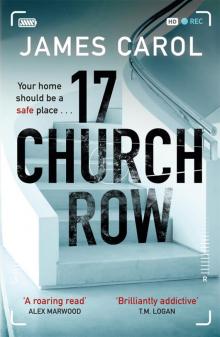 17 Church Row
17 Church Row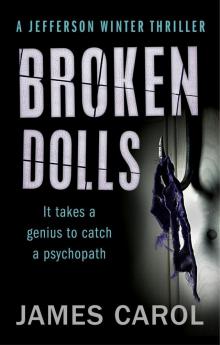 Broken Dolls (A Jefferson Winter Thriller)
Broken Dolls (A Jefferson Winter Thriller)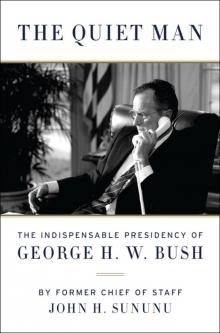 The Quiet Man
The Quiet Man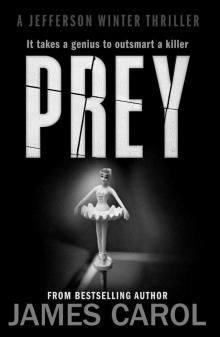 Prey (Jefferson Winter)
Prey (Jefferson Winter)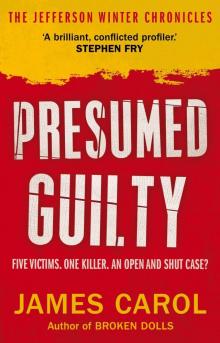 Presumed Guilty: (A Jefferson Winter novella)
Presumed Guilty: (A Jefferson Winter novella) Hush Little Baby
Hush Little Baby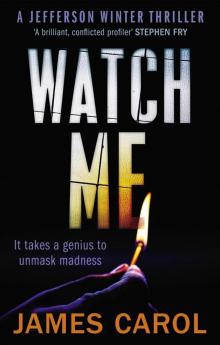 Watch Me (Jefferson Winter 2)
Watch Me (Jefferson Winter 2)